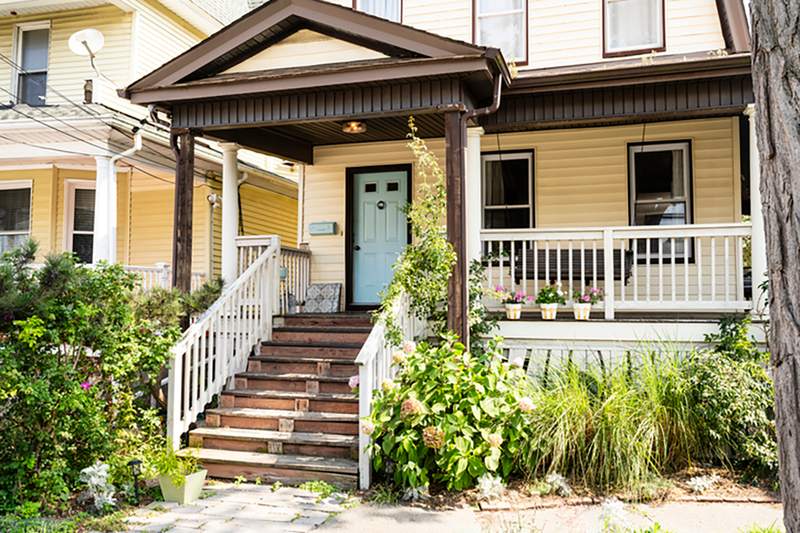If you’re renting a home or apartment, chances are that you have valuable personal property within it. While we all hope that nothing ever happens to our living spaces, it’s best to be prepared for emergencies. Renters insurance can give you the peace of mind that, even in the worst-case scenarios, your personal property is protected.
Find A Mortgage Today and Lock In Your Rate!
Get matched with a lender that will work for your financial situation.
How Does Renters Insurance Work?
Every company has different limits on its policies. However, renters insurance always focuses on four types of coverage: personal property coverage, renters liability coverage, guest medical expenses and additional living expenses.
Personal property coverage protects items that are destroyed or lost in emergencies. Some policies have limits on high-value items, so technology or expensive jewelry may exceed coverage limits. While all renters insurance will offer personal property coverage, there are two different ways companies provide that coverage. Either through actual cash value coverage or replacement cost coverage.
Actual cash value coverage means the insurer pays you the value of the damaged items, minus the deprecation of the items. Replacement cost coverage means the insurer pays you the value of getting a repaired or new version of the damaged item. Replacement cost coverage is usually a higher premium, but most preferred, especially for items with fast deprecation.
The other coverage options offered by renters insurance policies are also important to know. Renters liability coverage protects you in the case of a lawsuit for injuries or damaged property if you are found responsible.
Guest medical expenses covers the medical costs of someone if they get hurt in your home.
Additional living expenses provides coverage for expenses if you are displaced after damages in your home are severe enough that you must live somewhere else during repairs.
See What You Qualify For
Buy A Home
Discover mortgage options that fit your unique financial needs.

Refinance
Refinance your mortgage to have more money for what matters.
Tap Into Equity
Use your home’s equity and unlock cash to achieve your goals.
How To Get Renters Insurance: 5 Steps
If you’re renting a new space, getting renters insurance may seem intimidating. These five easy steps walk you through the process.
1. Calculate The Value Of What You Own
Many renters think they don’t need insurance because they don’t own many high-value items. However, prices of everyday items can be higher than you think. The cost of replacing clothes or kitchenware after an emergency can be a huge investment. Calculating the value of what you own ensures your renters insurance will accurately cover your financial losses when you make a claim.
Breaking down the value of each item is an important first step. This way, you’ll know of any specific items that may require special coverage. There are a few things you should do to properly track what you own.
- Document your items. Go through each room in your space and write down every item that could need to be replaced.
- Estimate the value of each item. Calculate how much it would cost to buy a new version of all personal property. You can look up current pricing, check old receipts, or use personal property value calculators to come up with an estimate.
- Record purchase dates. Write down the date you purchased every item. If depreciation is a factor in your coverage, then the age of the item is important. Include other details such as serial numbers if available. Document as much information as you can about each item, especially those of high value.
- Provide proof of purchase. Whether you have photos, receipts, or shipping information, make sure you have proof of your purchase. This way, if the item is destroyed or lost you have evidence to show your insurer.
- Store your document safely. Once you calculate the worth of your items, make sure you keep those details in a protected location such as a safe deposit box or make a digital copy.
2. Speak With Your Landlord
It’s important to check with your landlord to know what coverage they require, if any. It will likely be included in your lease agreement. Talking with your landlord can answer any questions you may have.
Ask what kind of policy they use for insurance. They might have homeowners insurance or landlords insurance, both of which can be used to cover the property they’re renting out to tenants. Most likely the landlord’s insurance will have no coverage for your belongings, but by checking with your landlord, you can discuss any coverage you may receive and how it could influence your renters insurance policy.
3. Determine What Kind Of Policy You Need
If you already have an insurance policy that covers other personal property, such as a car, start with that company when you’re deciding where to get renters insurance. There may be an opportunity to bundle those policies. Bundling means both your car and renters insurance would be provided by the same company for a better rate.
Another important factor when determining your policy is high-value personal property. Depending on the coverage limitations of a policy, high-value items may require additional coverage. Be sure to ask about limitations so your high-value items are fully insured.
Most renters insurance policies also have limits depending on the circumstances of the loss. For example, if you live in an area prone to certain natural disasters, you may need to get supplemental insurance at an added cost.
If you’re uncertain about what coverage you need, working with a licensed insurance agent can help you decide what policy is ideal for your circumstances.
4. Compare Quotes And Policies
Each insurance company will have its own renters insurance rates, even if the coverage is the same. It’s important to shop around and get multiple quotes from different companies so that you get the right coverage at the best rate.
Read reviews, investigate different policies, and talk to multiple insurance companies to get an idea of the price range. If a company has a higher renters insurance quote, make sure it’s for a good reason. By comparing, you can see if you’re getting more for that higher price and if it’s worth the investment.
5. Pick A Policy You Can Afford
Once you know what kind of policy you need and have compared a few companies, it’s time to pick the policy that’s best for you.
Make sure to prioritize what matters to you most, like needing coverage for high-value items. The best policy for you is unique to your belongings and situation. There’s no one-size-fits-all for renters insurance.
Find a policy that provides the coverage you need within your budget. Any renters insurance is better than none at all, so even if you can only afford the cheapest option, it is still worth it in case of a loss.
Renters Insurance FAQ
Now that you know how to get renters insurance, let’s answer any lingering questions.
What doesn’t renters insurance cover?
Coverage limitations are specific to your policy. Supplemental insurance can often fill any gaps, but in most cases, renters insurance will not cover damage to the structure of the building you’re renting or damage from floods and earthquakes.
How much does renters insurance cost?
Renters insurance varies based on the coverage you need, your location, and the condition of where you’re living. Based on the national average, it will be around $14 a month, but find a policy that suits your budget. You may be able to find something more affordable.
Do I need renters insurance?
While no one wants to imagine a worst-case scenario, renters insurance is a protection every renter can benefit from in the event of a loss. While you may only need it on occasion, the payout for a loss may be much greater than the monthly cost of buying the policy. If you can afford it, then renters insurance is a good idea for protecting your personal property.
Do I need to conduct an inventory of my belongings to get renters insurance?
You may be able to buy a policy without conducting an inventory of your belongings. However, if you don’t know the value of your belongings, you may pick a policy that doesn’t offer the coverage you need. To get the most out of your insurance, you should make an inventory of the items you own.
How does renters insurance work with roommates?
Your renters insurance will not cover your roommates. You will each need to buy your own policy. While you may be able to add your roommates to your current policy, it’s typically a better idea to have separate policies.
The Bottom Line
No matter what space you’re renting, protecting your belongings is important. If you’re planning on getting a new apartment, take a look at renters insurance policies ahead of time so you’re prepared.
Find A Mortgage Today and Lock In Your Rate!
Get matched with a lender that will work for your financial situation.

Kit Wakelin
Kit Wakelin is a freelance writer and a student at Liberty University majoring in English.












